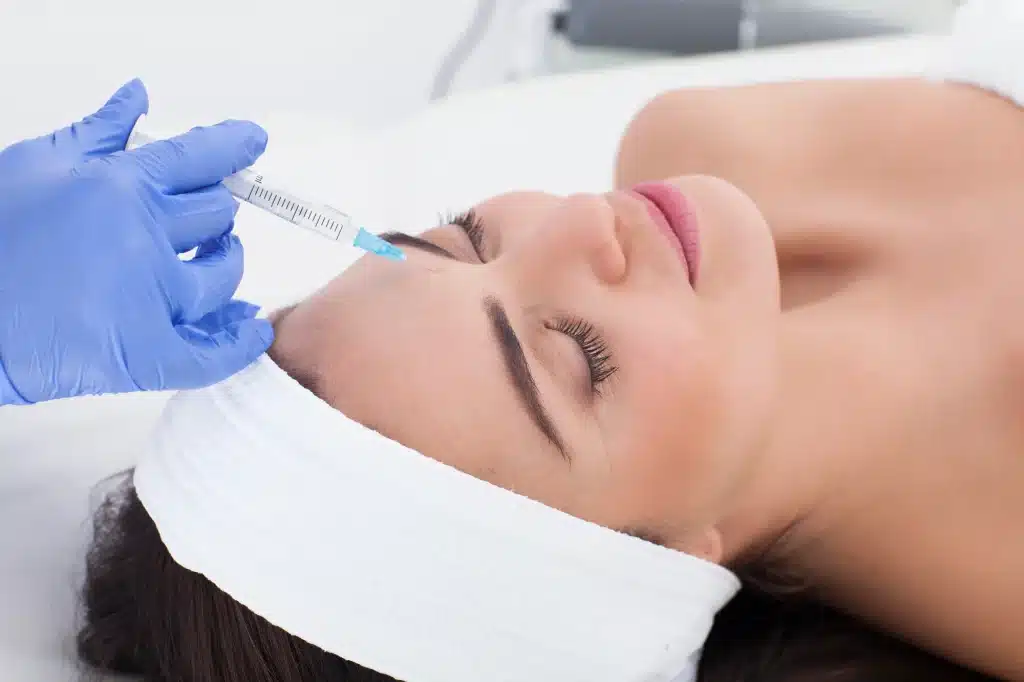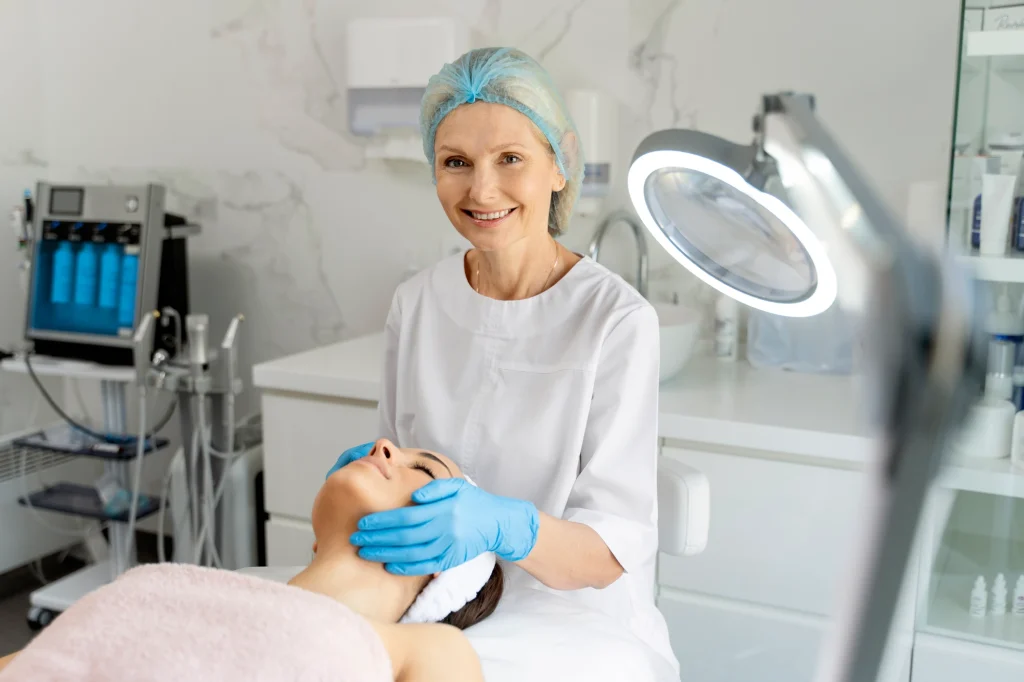In recent years, the concept of personalized skincare has gained significant attention, with advancements in DNA skin testing opening new possibilities for tailored treatments.
Genetics influence various aspects of our skin, such as elasticity, moisture retention, collagen production, and susceptibility to certain skin conditions. Therefore, by analyzing specific genes related to skin health, DNA testing can provide a lot of valuable information to help shape personalized skincare routines and treatment plans.
DNA Testing in Skin Care
Learning about a person’s DNA involves the analysis of information from a skin genetics test to identify specific variations or markers relevant to the patient’s health. These findings are then used to formulate skincare products or develop personalized treatment plans incorporating products like Radiesse, that address the individual’s unique genetic profile.
The main benefits of DNA testing for skin care are:
- Customized skincare products: DNA testing enables the formulation of tailored skincare products that address an individual’s unique genetic needs. This approach optimizes ingredient selection, concentration, and delivery methods to maximize efficacy and minimize potential adverse reactions.
- Targeted treatment: By identifying skin DNA markers associated with conditions like hyperpigmentation, aging, or inflammation, beauticians can design personalized treatment plans that effectively address these concerns.
- Prevention and early intervention on various skin issues: Identifying genetic predispositions for conditions such as skin cancer or collagen degradation allows for proactive measures and early interventions, improving preventive care.
- Enhanced efficacy: By tailoring treatments to an individual’s genetic profile, aesthetic professionals can optimize the effectiveness of procedures such as laser therapies, chemical peels, or injectables, resulting in improved patient outcomes.
DNA Testing Process
The DNA testing process involves first collecting a DNA sample from the patient, which can be obtained through non-invasive methods like saliva or cheek swabs. Typically, a skin DNA test kit is used for that purpose.
The sample is then analyzed by a laboratory where genetic variations related to skin health are examined. Emerging companies like Muhdo offer these laboratory services to medical professionals, providing a comprehensive report highlighting the patient’s biological age and genetic predispositions and allowing aesthetic doctors to develop personalized treatment plans based on the results.
Based on the DNA test results, the patient receives a personalized lifestyle plan, nutritional recommendations, and a selection of nutraceuticals and cosmeceuticals to improve skin health and imperfections like pigmentation and reduce visible signs of aging.
This type of testing provides a lot of helpful information that can be implemented in skincare routines, facials, and other treatments tailored to a patient’s specific needs.
Aspects of Skin Care in the DNA Test Results
DNA skincare test results can provide insights into various aspects of skin health and characteristics. Here are some of the key angles that can be assessed through DNA skin testing:
- Aging: DNA analysis can identify genetic variations associated with the aging process, such as the breakdown of collagen, the formation of wrinkles, and the efficiency of antioxidant defense mechanisms. This information can guide the development of targeted anti-aging strategies and help customize skincare regimens to address specific genetic factors related to aging.
- Skin sensitivity: Genetic analysis can reveal gene variations associated with skin sensitivity, including genes involved in inflammation and immune responses. Understanding these genetic factors can help determine appropriate skincare products and ingredients that minimize skin reactions and improve overall skin tolerance.
- Sun damage: Certain genetic variations can affect an individual’s susceptibility to sun damage and the ability to repair UV-induced DNA damage. By identifying these variations, it is possible to provide personalized recommendations for sun protection and repair strategies to mitigate the risk of sun-related skin damage.
- Moisture retention: DNA analysis can uncover variations in genes related to skin barrier function and moisture retention. This information can guide the selection of skincare products and ingredients that enhance hydration and improve the skin’s natural moisture balance.
- Pigmentation, including the production and distribution of melanin: DNA analysis can provide insights into an individual’s genetic predisposition to conditions like hyperpigmentation, melasma, or uneven skin tone. This knowledge can assist in the development of targeted treatments or preventive measures.
- Collagen production: Genetic variations can impact the synthesis and degradation of collagen, a protein vital for retaining skin elasticity and firmness. Understanding an individual’s genetic profile concerning collagen metabolism can guide the selection of skincare ingredients and treatments to promote collagen production and maintain skin suppleness.
As testing DNA for skin care purposes is still a developing field, the specific aspects assessed may vary depending on the testing method and expertise of the genetic testing provider. As such, the interpretation of genetic variations requires careful consideration and validation, and the practical application of genetic insights in skincare is an area of ongoing research and exploration.
Furthermore, patient education plays a vital role in DNA-based skin care. Aesthetic doctors are responsible for informing their patients about the limitations and benefits of genetic testing, letting people make informed decisions about their skincare journeys.
Communicate the importance of considering genetic information alongside other factors, such as lifestyle choices, environmental exposure, and skincare routines, to achieve a comprehensive and holistic approach to skincare management.
Conclusion
DNA testing represents an exciting frontier in personalized aesthetic medicine. By leveraging genetic information, aesthetic doctors can optimize treatment outcomes, develop customized skincare regimens, and offer their patients a higher level of care.
Embracing this emerging technology alongside established clinical expertise will empower beauticians to deliver personalized treatments that enhance patient satisfaction and long-term skin health.
Incorporating DNA-based skin testing into your practice can provide you both with a competitive edge and demonstrate your commitment to keeping up with advancements at the forefront of the skincare industry. In addition, by choosing to offer personalized treatments based on results from genetic insights, doctors can enhance patient satisfaction, treatment outcomes, and establish strong, long-term relationships built on trust and exceptional care.
To implement DNA testing results effectively, it is crucial to collaborate with reputable DNA testing providers and laboratories that specialize in genetic analysis related to skin health. Selecting a reliable partner ensures accurate results and doctor-patient confidentiality.
FAQ
Can skin be used for DNA testing?
Yes, skin can be used for DNA testing. DNA can be extracted from various sources, including skin cells, as they contain genetic material that can be examined to provide valuable insights into an individual’s genetic profile.
There are different methods for obtaining skin cells for DNA testing. One common approach is a non-invasive buccal swab method that involves gently swabbing the inside of the cheek to collect cells from the oral mucosa. These cells contain DNA that can be extracted and analyzed for genetic testing.
In some cases, a skin biopsy may be necessary to obtain an adequate amount of DNA for testing. A small sample of skin tissue is taken using a sterile procedure and sent to a laboratory for DNA extraction and analysis. This method is more invasive than a buccal swab but may be required for specific genetic tests or research purposes.
What is DNA-based skincare?
DNA-based skincare refers to using genetic information and insights obtained from an individual’s DNA to tailor skincare products and treatments to their specific needs.
DNA skincare aims to provide personalized and targeted solutions by identifying genetic markers that may influence various aspects of skin health, such as:
- Collagen production;
- Antioxidant capacity;
- Moisture retention;
- Susceptibility to certain skin conditions.
Skincare formulations can be customized to address specific concerns and optimize results by understanding these genetic factors.
DNA-based skincare aims to optimize skincare treatments’ effectiveness by tailoring them to an individual’s genetic predispositions. Addressing the unique needs identified through genetic analysis can lead to more targeted and precise skincare interventions, potentially enhancing the skin’s overall health, appearance, and longevity.
References
Markiewicz, E., & Idowu, O. C. (2018). Personalized skincare: From molecular basis to clinical and commercial applications. Clinical, Cosmetic and Investigational Dermatology, 11, 161-171. https://doi.org/10.2147/CCID.S163799.
Oh J, Byrd AL, Deming C, Conlan S, Kong HH, Segre JA. Biogeography and individuality shape function in the human skin metagenome. Nature. 2014;514(7520):59–64. https://doi.org/10.1038%2Fnature13786.
Markiewicz E, Idowu OC. Evaluation of Personalized Skincare Through in-silico Gene Interactive Networks and Cellular Responses to UVR and Oxidative Stress. Clin Cosmet Investig Dermatol. 2022 Oct 19;15:2221-2243. doi: 10.2147/CCID.S383790. PMID: 36284733; PMCID: PMC9588296.
Sulem P, Gudbjartsson DF, Stacey SN, Helgason A, Rafnar T, Magnusson KP, Manolescu A, Karason A, Palsson A, Thorleifsson G, Jakobsdottir M, Steinberg S, Pálsson S, Jonasson F, Sigurgeirsson B, Thorisdottir K, Ragnarsson R, Benediktsdottir KR, Aben KK, Kiemeney LA, Olafsson JH, Gulcher J, Kong A, Thorsteinsdottir U, Stefansson K. Genetic determinants of hair, eye and skin pigmentation in Europeans. Nat Genet. 2007 Dec;39(12):1443-52. doi: 10.1038/ng.2007.13. Epub 2007 Oct 21. PMID: 17952075.
Vashi NA, de Castro Maymone MB, Kundu RV. Aging Differences in Ethnic Skin. J Clin Aesthet Dermatol. 2016 Jan;9(1):31-8. PMID: 26962390; PMCID: PMC4756870.
A Brief Guide To Genomics. National Human Genome Research Institute https://www.genome.gov/about-genomics/fact-sheets/A-Brief-Guide-to-Genomics.



















